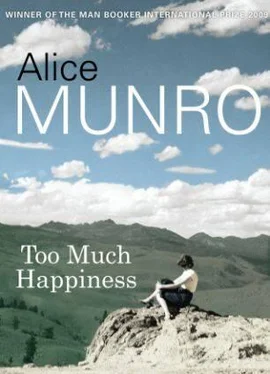She grasped the various straps and started to run. She ran lurching and panting with a pain in her chest and around under her arms and the bags bumping against her legs. There were steps to climb. If she stopped for a breath she would be too late. She climbed. With tears of self-pity filling her eyes she beseeched the train not to move.
And it did not. Not till the conductor, leaning out to fasten the door, caught her arm, then somehow managed to catch her bags and pulled all aboard.
Once saved, she began to cough. She was trying to cough something out of her chest. The pain, out of her chest. The pain and tightness out of her throat. But she had to follow the conductor to her compartment, and she was laughing with triumph in between spells of coughing. The conductor looked into a compartment where there were already some people sitting, then took her along to one that was empty.
“You were right. To put me where I cannot. Be a nuisance,” she said, beaming. “I didn’t have money. Swedish money. All other kinds but Swedish. I had to run. I never thought I could-”
He told her to sit down and save her breath. He went away and came back soon with a glass of water. As she drank she thought of the tablet that had been given her, and took it with the last gulp of water. The coughing subsided.
“You must not do that again,” he said. “Your chest is heaving. Up and down.”
Swedes were very frank, as well as being reserved and punctual.
“Wait,” she said.
For there was something else to be established, almost as if the train could not get her to the right place otherwise.
“Wait a moment. Did you hear about-? Did you hear there is smallpox? In Copenhagen?”
“I shouldn’t think so,” he said. He gave a severe though courteous nod and left her.
“Thank you. Thank you,” she called after him.
Sophia has never been drunk in her life. Any medicine she has taken, that might addle her brain, has put her to sleep before any such disturbance could happen. So she has nothing with which to compare the extraordinary feeling-the change of perception-which is rippling through her now. At first it might have been just relief, a grand though silly sense of being favored, because she had managed to carry her bags and run up the steps and reach her train. And then she had survived the fit of coughing and the squeezing of her heart and been able somehow to disregard her throat.
But there is more, as if her heart could go on expanding, regaining its normal condition, and continuing after that to grow lighter and fresher and puff things almost humorously out of her way. Even the epidemic in Copenhagen could now become something like a plague in a ballad, part of an old story. As her own life could be, its bumps and sorrows turning into illusions. Events and ideas now taking on a new shape, seen through sheets of clear intelligence, a transforming glass.
There was one experience that this reminded her of. That was her first stumbling on trigonometry, when she was twelve years old. Professor Tyrtov, a neighbor at Palibino, had dropped off the new text he had written. He thought it might interest her father the General, with his knowledge of artillery. She came upon it in the study and opened it by chance at the chapter on optics. She began to read it and to study the diagrams and she was convinced that shortly she would be able to understand it. She had never heard of sines or cosines, but by substituting the chord of an arc for the sine, and by the lucky chance that in small angles these almost coincide, she was able to break into this new and delightful language.
She was not very surprised then, though intensely happy.
Such discoveries would happen. Mathematics was a natural gift, like the northern lights. It was not mixed up with anything else in the world, not with papers, prizes, colleagues, and diplomas.
The conductor woke her a little while before the train reached Stockholm. She said, “What day is this?”
“It is Friday.”
“Good. Good, I will be able to give my lecture.”
“Take care of your health, madam.”
At two o’clock she was behind her lectern, and she lectured ably and coherently, without any pain or coughing. The delicate hum that had been travelling through her body, as on a wire, did not affect her voice. And her throat seemed to have healed itself. When she was finished she went home and changed her dress and took a cab to the reception she had been invited to, at the Guldens’ house. She was in good spirits, talking brightly about her impressions of Italy and the south of France, though not about her trip back to Sweden. Then she left the room without excusing herself and went outside. She was too full of glowing and exceptional ideas to speak to people any longer.
Darkness already, snow falling, without any wind, the street-lamps enlarged like Christmas globes. She looked around for a cab but did not see one. An omnibus was passing and she waved it down. The driver informed her that this was not a scheduled stop.
“But you stopped,” she said without concern.
She did not know the streets of Stockholm at all well, so it was some time later that she realized she had been travelling into the wrong part of town. She laughed as she explained this to the driver, and he let her off to walk home through the snow in her party dress and her light cloak and slippers. The pavements were wonderfully silent and white. She had to walk about a mile, but was pleased to discover that she knew the way, after all. Her feet were soaked but she was not cold. She thought this was because of the lack of wind, and the enchantment in her mind and body that she had never been aware of before, but could certainly count on from now on. It might be quite unoriginal to say so, but the city was like a city in a fairy tale.
The next day she stayed in bed, and sent a note to her colleague Mittag-Leffler asking him to get her his doctor, as she had none. He came himself as well, and during a long visit she talked to him with great excitement about a new mathematical work she was planning. It was more ambitious, more important, more beautiful, than anything that had occurred to her up until this time.
The doctor thought that the problem was with her kidneys, and left her some medicine.
“I forgot to ask him,” Sophia said when he had gone.
“Ask him what?” said Mittag-Leffler.
“Is there plague? In Copenhagen?”
“You’re dreaming,” said Mittag-Leffler gently. “Who told you that?”
“A blind man,” she said. Then she said, “No, I meant kind. Kind man.” She waved her hands about, as if trying to make some shape that would fit better than words. “My Swedish,” she said.
“Wait to speak until you are better.”
She smiled and then looked sad. She said with emphasis, “My husband.”
“Your betrothed? Ah, he is not your husband yet. I am teasing you. Would you like him to come?”
But she shook her head. She said, “Not him. Bothwell.
“No. No. No,” she said rapidly. “The other.”
“You must rest.”
Teresa Gulden and her daughter Elsa had come, also Ellen Key. They were to take turns nursing her. After Mittag-Leffler had gone she slept awhile. When she woke she was talkative again but did not mention a husband. She talked about her novel, and about the book of recollections of her youth at Palibino. She said she could do something much better now and started to describe her idea for a new story. She became confused and laughed because she was not doing this more clearly. There was a movement back and forth, she said, there was a pulse in life. Her hope was that in this piece of writing she would discover what went on. Something underlying. Invented, but not.
What could she mean by this? She laughed.
Читать дальше












